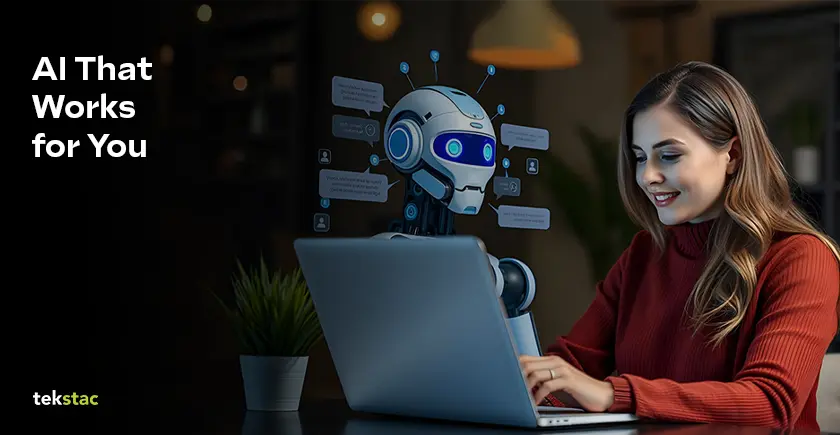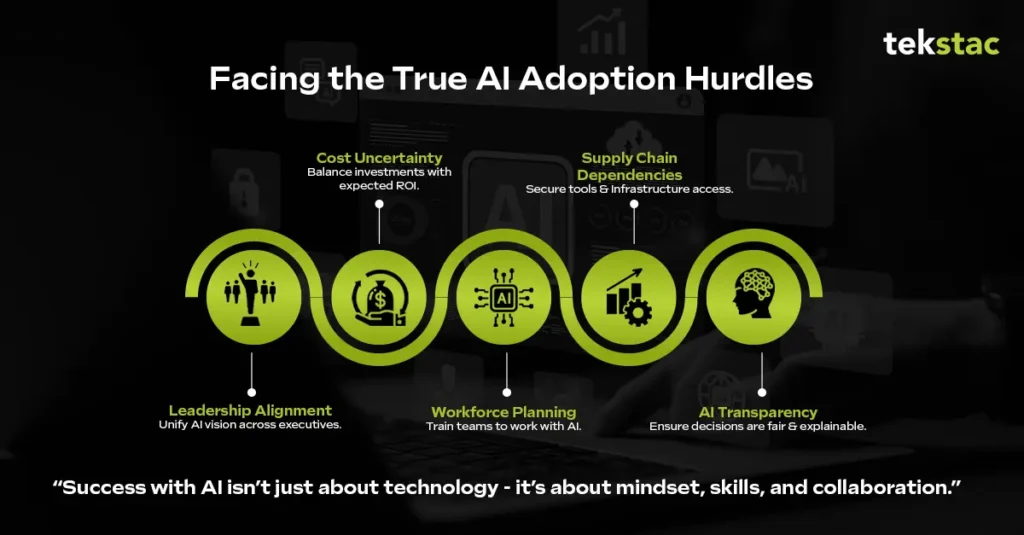AI Work Strategy: How Businesses Move From Hype to Impact
April 17, 2025

Last updated on February 13th, 2026
Based on the McKinsey report “Superagency in the Workplace – Empowering People to Unlock AI’s Full Potential”
AI Work Begins Now: Are You Ready?
AI work refers to the integration of artificial intelligence into everyday business processes, decision-making, and workforce productivity. It goes beyond automation to include AI-assisted collaboration, generative AI tools, and data-driven strategy execution across departments.
Artificial Intelligence (AI) is no longer a futuristic vision, it is here, reshaping industries at an unprecedented pace. Much like the steam engine revolutionized production during the Industrial Revolution, AI has the potential to redefine work, productivity, and economic growth. However, despite 92% of organizations planning to increase AI investments over the next three years, only 1% consider themselves AI-mature.
The key roadblock? Leadership readiness.
Organizations must move beyond small-scale AI initiatives and embrace bold AI-driven transformations to maintain a competitive edge.
How AI Is Reshaping the Modern Workplace
AI is no longer just about automation; it is enabling smarter decision-making, problem-solving, and operational efficiency across industries. AI work is transforming how teams collaborate, analyze data, and execute strategies at scale. Generative AI alone is projected to generate $4.4 trillion in productivity gains. Yet, despite these promising numbers, many companies hesitate to move beyond the pilot phase of AI implementation.
Forward-thinking businesses understand that AI can:
- Enhance operational efficiency and decision-making.
- Improve customer experiences through personalized interactions.
- Drive innovation by identifying market trends and optimizing business strategies.
The question is not whether companies should adopt AI but how effectively they can deploy it at scale.
The AI Adoption Gap Between Employees and Leadership
One of the most striking findings of the MC Kinsey report is that employees are adopting AI faster than leaders anticipate:
- Three times more employees use AI in their daily tasks than executives estimate.
- 70% of employees believe AI will significantly alter at least 30% of their work within two years.
- Only 20% of leaders foresee AI transforming workflows in the near future.
This misalignment presents a major challenge for scaling AI work across the organization. Employees are ready for AI-driven change, but leadership hesitancy is slowing progress. Organizations need to bridge this gap by educating leaders, fostering AI-friendly workplace cultures, and integrating AI into strategic planning.
A critical piece of this puzzle is investing in learning and skilling programs that empower both employees and leaders to understand, adapt to, and fully leverage AI technologies.
This is where platform like Tekstac play a pivotal role to integrates AI-driven personalized learning, assessments, and skill development into the workplace. By aligning learning paths with role-specific needs, Tekstac helps individuals and organizations build the AI fluency required to lead transformation, not just follow it.
Whether it’s through simulated assessments, AI-proctored environments, or performance dashboards, we ensures continuous upskilling aligned with evolving industry demands.
Balancing AI Innovation With Governance and Risk Management
With AI adoption comes responsibility. Businesses must balance the rapid deployment of AI with concerns around cybersecurity, bias, and ethical decision-making.
Key concerns include:
- Cybersecurity risks –51% of employees cite security vulnerabilities as their top AI concern.
- AI bias and fairness – Organizations must ensure AI models are transparent and equitable.
- AI explainability – Businesses need AI systems that provide clear, logical justifications for their decisions.
To mitigate these risks, organizations should implement robust AI governance frameworks, establish ethical benchmarks, and ensure compliance with data privacy regulations.
From Pilot Projects to Enterprise-Wide AI Transformation
Many companies take a cautious approach to AI, experimenting with small-scale projects rather than fully embedding AI into their core operations. However, true transformation requires bold AI ambitions. Industries such as healthcare, finance, and retail are already seeing the benefits of large-scale AI integration:
- Healthcare – AI-driven drug discovery and personalized treatment plans.
- Finance – AI-powered fraud detection and predictive analytics.
- Retail – AI-driven demand forecasting and customer insights.
Organizations that continue treating AI as an auxiliary tool rather than a fundamental part of their business model risk falling behind.
Why Organizational Readiness Determines AI Success
Despite the rapid advancement of AI technology, organizations face several operational challenges when it comes to AI adoption. The report highlights five major hurdles:

- Leadership alignment – Executives must develop a unified AI vision.
- Cost uncertainty – AI investments should be balanced with long-term ROI expectations.
- Workforce planning – Employees must be trained to work alongside AI rather than fear job displacement.
- Supply chain dependencies – Businesses need access to the right AI tools and infrastructure.
- AI transparency – AI-driven decisions must be understandable and unbiased.
Overcoming these challenges requires strategic planning, cross-functional collaboration, and a commitment to continuous learning and adaptation.
Key Insights From McKinsey’s AI Workplace Research
1. Leadership inertia is the bottleneck
While 92% of companies plan to increase AI investments, only 1% consider themselves AI-mature—largely because leadership hasn’t aligned on bold, long-term AI strategies.
2. Employees are ahead of the curve
There’s a striking mismatch between executive perception and employee reality: three times more employees are using AI than leaders estimate, and 70% expect AI to significantly reshape their work within two years.
3. Ethical and secure AI is non-negotiable
As organizations scale AI, concerns around cybersecurity, data privacy, and algorithmic bias must be actively addressed. AI governance, explainability, and fairness should be foundational—not afterthoughts.
4. Small pilots are not enough
To unlock transformative value, businesses must move beyond incremental efforts and fully embed AI into their core workflows, products, and services.
5. Skilling is a strategic lever
Organizational capability depends on a well-trained, AI-literate workforce that includes both frontline employees and C-suite leaders.
Building a Sustainable AI Work Strategy for Long-Term Growth
AI presents limitless opportunities, but only organizations that act decisively will unlock its full potential. Leaders must step up, align AI strategies with business objectives, and foster AI-literate workplaces.
To succeed in the AI-driven future, businesses must:
- Invest in AI training for employees and leadership alike.
- Implement ethical AI governance to ensure responsible AI use.
- Scale AI adoption beyond experimental phases to drive tangible business impact.
- Embrace bold AI ambitions that transform workflows and create new opportunities.
AI work is no longer optional; it is a strategic imperative. The time to act is now. Organizations that embed AI work into their culture, leadership strategy, and daily operations will not only stay competitive but help shape the future of work itself.
FAQs About AI Work and Enterprise Strategy
1. What is the work of AI?
AI work refers to the integration of artificial intelligence into everyday business processes, workflows, and decision-making. It goes beyond automation to include AI-assisted collaboration, generative AI tools, predictive analytics, and data-driven strategy execution across departments. AI work transforms how employees perform tasks, analyze information, and deliver value.
2. What is the leadership gap in AI work adoption?
The leadership gap refers to the disconnect between how executives perceive AI adoption and how employees are using AI tools. Many employees already integrate AI into daily tasks, while leadership often underestimates its impact. Bridging this gap is essential to unlocking enterprise-wide AI value.
3. What role does workforce skilling play in AI work?
Workforce skilling ensures employees and leaders can effectively collaborate with AI systems. Without structured training and continuous learning programs, AI investments fail to deliver measurable impact. AI work success depends on developing digital fluency, ethical awareness, and data literacy across the organization.





